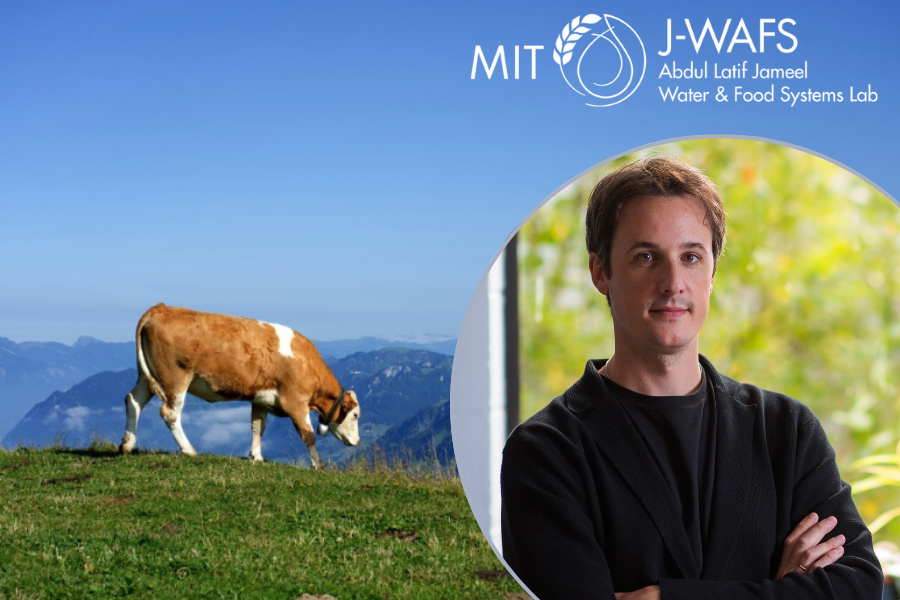News J-WAFS awards 2024 Animal Ag Grant
César Terrer is developing a comprehensive global database to capture detailed greenhouse gas emissions from livestock grazing.
Jiaqi Zhang Abdul Latif Jameel Water and Food Systems Lab May 30, 2024

A cow grazing on a mountainous pasture on the left, photo by Wolfgang Hasselmann on Unsplash, and headshot of César Terrer on the right.
J-WAFS is pleased to announce that the 2024 J-WAFS Grant for Transforming Animal Agriculture Systems has been awarded to Assistant Professor César Terrer for his project: The role of livestock in climate change: “Holistic greenhouse gas assessments and implications for human diets.” The J-WAFS Grant for Transforming Animal Agriculture Systems supports MIT research that addresses the challenges and environmental impacts of industrialized food animal production (IFAP). Specifically, the grant program aims to support projects focused on low- and middle-income countries (LMICs), where IFAP is expanding, along with potential negative effects.
About the recipient
César Terrer is a tenure-track assistant professor in the Department of Civil and Environmental Engineering at MIT. An expert in climate and carbon-cycle science, his research focuses on understanding and mitigating the impacts of climate change on terrestrial ecosystems. Terrer has authored numerous high-impact publications, including articles in the journals Nature and Science. He has also served as an advisor for large corporate entities on natural climate solutions. His work is recognized for its significant contributions to both scientific understanding and practical climate solutions.
About the project
Climate change remains a pressing challenge in low- and middle-income countries (LMICs). Livestock grazing, a predominant agricultural practice in these regions, plays a significant role in environmental degradation and climate change, influencing land use, soil composition, and vegetation patterns. These factors collectively alter the atmospheric levels of greenhouse gases (GHGs). This project aims to develop a nuanced understanding of how these emissions can be managed and reduced, utilizing scientific research to foster sustainable agricultural practices across various ecosystems.
The cornerstone of the project is the creation of a global database on GHG emissions from livestock grazing. This unprecedented compilation of data will integrate information from both existing studies and new research initiatives, enabling analysis of emission patterns associated with different grazing practices. The data will provide scientists, policymakers, and farmers with critical insights into the environmental impacts of livestock management. This knowledge is intended to guide informed decision making that aligns agricultural productivity with ecological sustainability, ultimately aiding in the reduction of the carbon footprint associated with livestock farming.
Expanding beyond data collection, the research team is set to employ advanced predictive modeling techniques to project future emission trends under diverse livestock management and climatic conditions. This predictive framework will help in pinpointing the most impactful strategies for mitigating emissions in the grazing sector. Additionally, the project will explore alternative grazing management and human dietary changes that could further diminish GHG emissions while enhancing the carbon sequestration capabilities of soils. Through these multifaceted approaches, the project not only aims to mitigate the adverse effects of traditional grazing practices but also transform agricultural land into valuable carbon sinks, thereby contributing significantly to global climate change mitigation efforts.